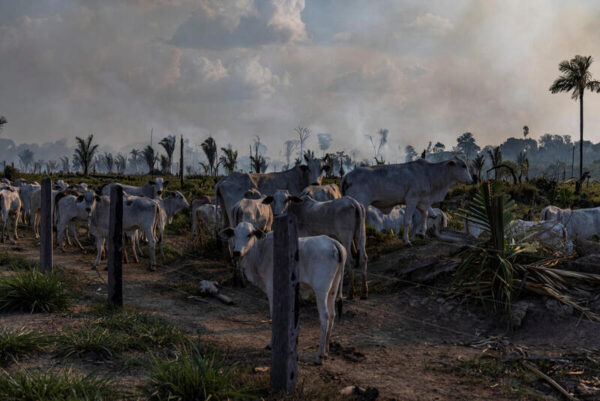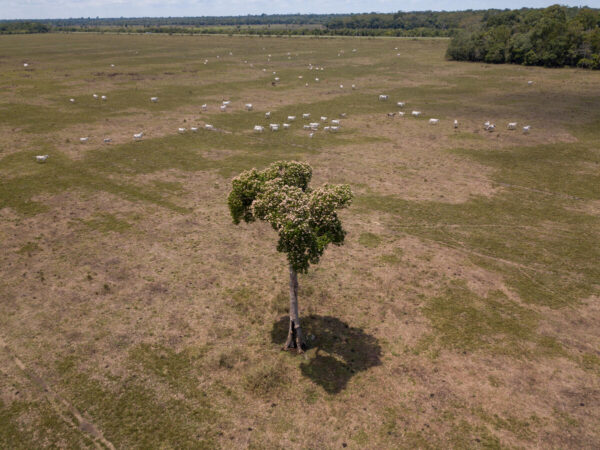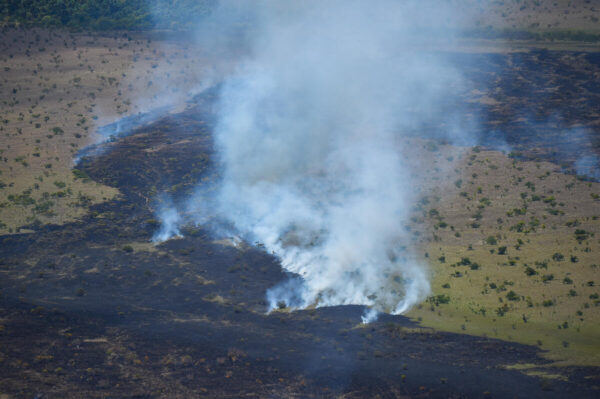Analysis: Do the meat industry’s promises on deforestation add up?
The world’s biggest meat suppliers, JBS, Marfrig and Minerva have committed to cleaning up their supply chains by 2030. But a guest analysis from Repórter Brasil shows a lack of transparency and systems that are vulnerable to fraud.

As pressure from investors and consumers mounts, the three large Brazilian meatpackers operating in the Amazon have declared their supply chains will be free of illegal deforestation by the end of the decade or earlier.
JBS, Marfrig, and Minerva are Brazil’s largest meat processors. They dominate beef processing and Brazilian beef exports. In fact, beyond Brazil, they dominate the whole meat industry supplying supermarkets and fast food chains in the UK and around the world.
Their claims are ambitious – 90% of the trees felled in the largest tropical forest on the planet become pasture for beef. But a closer look also suggests that the pledges may be inadequate to fully clean up their supply chains.
Our analysis has found that the companies’ systems for supply chain monitoring will rely on official documents that can be susceptible to fraud, and on data provided by cattle ranchers themselves, who may have little motivation to self-report information that could compromise their ability to sell to the beef giants.
The companies say they are working to monitor their supply chains and mitigate risks. JBS called Amazon deforestation a “sectorial challenge that JBS and all the other market actors have been putting concerted efforts to find a solution for decades” and added that:
“Our operations are regularly audited and verified by external, independent parties, and the results are made public, aiming at preventing any distortion and maintaining our accuracy, following our principles of corporate governance and compliance.”
Marfrig said: “Marfrig is fully aware of the challenges related to the livestock production chain and recognizes its role as an important agent of transformation to guarantee production in relation to the conservation of Brazilian biomes, especially the Amazon. And it reaffirms all of its socio-environmental commitments, especially its efforts to ensure a supply chain free from deforestation.”
Governments say they can’t expose information about the cattle, but in the meantime the Amazon is being devastated
Minerva said: “We understand that the sustainability of our business depends on the maintenance of the ecosystems that sustain agricultural production. Our focus is on action now to prevent the worst effects of climate change while supporting farmers in implementing practices that sequester and stock carbon, protect biodiversity, and increase resilience.”
Brazil’s cattle supply chain is complex, with thousands of suppliers stretching over vast areas. Cattle can be moved multiple times, from ranch to ranch, to fatten them up or – sometimes – to obscure their connection to farms with deforestation. It is relatively straight-forward to ensure a direct supplier to an abattoir doesn’t cause deforestation. Indirect suppliers, the ranchers lower down the cattle fattening supply chain, are another matter entirely, and it is through them that the vast majority of deforestation enters the beef supply chain today.

A world leader in protein production, JBS has said its supply chain will have zero illegal deforestation by 2025. However, its plans so far only go as far as the first level of suppliers of its own direct suppliers, leaving out tier 2 producers–that is, the third farm in the supply chain going down from the slaughterhouse to where the cow is born.
That matters because these tier 2 suppliers may account for up to 11% of deforestation associated with livestock. One direct supplier to JBS, for example, might buy cattle from 10 or more ranches. But they, in turn, might buy live cattle from elsewhere in a huge network of ranches specialised in the different stages of raising and breeding cattle.
JBS said that focusing on tier 1 suppliers was established in 2019 by the independent Working Group on Indirect Suppliers (GTFI) as a good practice for allowing “most deforestation coverage.”
JBS has only two and a half years remaining to achieve its goal of zero illegal deforestation. But the company admitted to Repórter Brasil that it “does not have an estimate on the number” of cattle ranchers it would need to include in its monitoring system to fully realise this target.
“Due to the complexity of the JBS supply chain, the accuracy of these figures will be enhanced once a critical mass of our suppliers are involved in our system”, a spokesperson said in an emailed statement. “When feasible, monitoring other tiers [of suppliers] will happen naturally.”
Marfrig has also given itself a 2025 deadline for ridding all levels of its operations in the Amazon of illegal deforestation. In the Cerrado biome, Marfrig’s target is 2030. Marfrig told Repórter Brasil that:
“In 2021, in addition to the 100% of direct suppliers that it already monitors, Marfrig has already identified 63.21% of the indirect suppliers that supply its direct suppliers in the Amazon Biome.” In other words, with three years to reach its deadline, 37% of the ranches which sell cattle to Marfrig’s direct suppliers in the Amazon remain a blind spot’.
“Every control system is essentially a risk mitigator and Marfrig has been seeking to develop the best operational practices and implement the most advanced technology in order to make the system as robust as possible,” a Marfrig spokesperson said.
Minerva has committed to eliminate deforestation in its supply chain across South America by 2030. But the parameters it defines as “good practices” in its evaluations of indirect suppliers can be, in practice, relatively permissive towards deforestation. For example, a direct supplier will not face consequences if it has only one illegally deforesting farm in its supply chain: “The zero-tolerance approach would be unfeasible and unfair,” says the GTFI, which formulated the criteria.
The GTFI guidelines, also used by JBS, also ignore any illegal deforestation that took place before August 1, 2019 – a very recent deadline – when the agreement was signed between the industry and other members of the group, such as supermarkets and non-governmental organisations. By way of comparison, the Amazon Soya Moratorium bans the sale of soya grown on land deforested before July 2008.
In a 2020 audit prosecutors found that more than 30% of the cattle bought by JBS in Pará state between January 2018 and June 2019 came from ranches with “irregularities” such as illegal deforestation.
What makes JBS believe that producers are providing the full list of their indirect suppliers?
“Most of the areas deforested in the Amazon turn into pasture for livestock, and the industry has not been able to completely prevent these animals from entering their supply chains,” Prosecutor Daniel Azeredo from the Federal Prosecution Service (MPF) told Repórter Brasil. Since 2009, he has led an effort to inspect and monitor meatpackers’ purchases, known as the Meat Conduct Adjustment Agreement (TAC).
Despite these inconsistencies, the meatpackers sound optimistic. JBS says its suppliers have joined its new monitoring platform “positively and with rapid progress,” and reiterates that “it is committed to engaging the entire supply chain to increase traceability.” Marfrig says it has been implementing “the best practices available in Brazil” and that it also uses its own methodologies and instruments to identify indirect supply and trace the supply chain. Minerva “has been adopting initiatives for an increasingly sustainable production throughout the value chain” for the past 10 years, it says. Read the companies’ full statements in English and Portuguese here.
Indirect suppliers still a challenge
All three meatpackers have launched mechanisms to tackle the problem of deforestation by indirect suppliers in the last two years. These systems largely rely on the ranchers that sell cattle directly to JBS, Marfrig and Minerva slaughterhouses – direct suppliers – voluntarily providing the meatpackers with information about their own suppliers – indirect suppliers.
JBS’s Transparent Livestock platform uses blockchain technology, which JBS said guarantees confidentiality of information. “JBS will not have access to the data. Direct suppliers themselves will manage their suppliers, using the same socio-environmental criteria as the company,” JBS said.
But experts say there can be little motivation for the suppliers to volunteer information that they believe could compromise their business.
“What makes JBS believe that producers are providing the full list of their indirect suppliers? Ranchers will not report problems that could take them out of the market,” said Ritaumaria Pereira, executive director of the Amazon Institute of People and the Environment (Imazon), an NGO that studies the links between deforestation, livestock and the meat market.

JBS has said verification of the data on its Transparent Livestock platform would be carried out by the Brazilian Confederation of Agriculture and Livestock (CNA)–but only when authorised by the producer in question. CNA is a national ranchers’ association that defends the interests of big farmers. CNA declined to answer Repórter Brasil’s questions about how it will verify suppliers and guarantee objectivity.
The overwhelming majority refuses to provide this information; it’s like asking how much money they have in their bank accounts
However, some people in the sector suggest that cattle ranchers may be uncomfortable with the idea of providing information about their livestock and suppliers to the Brazilian beef giants’ systems.
“Seventy percent of the suppliers haven’t joined [these platforms]”, estimated Hélio Dias de Souza, president of Feparon, the Federation of Agriculture and Livestock of Rondônia, which has the third largest number of cattle in the Amazon.
“The overwhelming majority refuses to provide this information; it’s like asking how much money they have in their bank accounts,” said zootechnician Guilherme Minssen, from the Federation of Agriculture and Livestock of the State of Pará (Faepa). Minssen said that suppliers worry that providing data could give meatpackers a commercial advantage in negotiating prices. They know that “when supply is higher, meatpackers press for lower prices,” he added.
Producers in Mato Grosso – the Brazilian state with the most cattle – have the same concerns: Amarildo Merotti has been a cattle rancher for more than 30 years in the Cáceres area. He was one of the JBS suppliers who used JBS’s “Green Offices”, a initiative launched to provide free support for suppliers to improve the environmental performance of their properties. He appears praising the company’s sustainability performance on an institutional video published on the Pecuária Transparente (Transparent Livestock) website. But Merotti admitted to Repórter Brasil that he has not yet registered his suppliers on the platform: “The procedures are still not clear,” he said.
Doubts over monitoring
In addition to information provided by direct producers, Marfrig and Minerva have said that they will use a tool called Visipec, which has its own database to look at the environmental profile of indirect producers.
The tool uses Animal Transit Guides (GTA) and official documents submitted by ranchers to the Rural Environmental Register (CAR).
“The best way to monitor indirect suppliers is to use CAR and GTA because these documents can enable scalability and allow a quick analysis of the supply chain,” said Pedro Burnier, manager of Friends of the Earth-Brazilian Amazon, which is part of the Working Group of Indirect Suppliers, alongside meatpackers.
But a recent study showed that only 1% of Amazon state CAR registrations have been checked and verified by the authorities. For the other 99%, only the farmer’s word counts. To put it another way, as long as the farmer submits a form saying they have complied with Brazil’s deforestation rules, they can buy and sell cattle, or take out bank loans, regardless of the situation on the ground. Last month, a study by the Amazon Environmental Research Institute (IPAM) showed that 65% of deforestation in undesignated public forests – areas of the Amazon which are very vulnerable to land-grabbing – happened on land where there was a fraudulent CAR registration.
Meanwhile, Animal Transit Guides (GTAs) can be filled in by hand, making them vulnerable to fraud. When an owner changes cattle’s registration to mask their origin, this is known as “cattle laundering”.
“It’s not clear how meatpackers’ systems will prevent a producer whose status in the supply chain is legal from washing cattle from irregular farms,” said Imazon’s Pereira.
Even so, the GTAs are a crucial resource for tracking cattle through the supply chain. But they are not transparently available to the public, even though the Federal Prosecution Service recommended to the government in 2015 that they ought to be, and filed a lawsuit to force the disclosure of animal transit data.
“Governments say they can’t expose information about the cattle, but in the meantime the Amazon is being devastated,” says Ricardo Negrini, a federal prosecutor in Pará state.
“If the monitoring continues as it is now [based on GTAs], these data must be fully open so the sources of the animals can be analysed from birth,” Pereira added.
Marfrig admits that verification procedures can be “subject to fraud.” Minerva, which has committed to eliminate deforestation in its supply chain across South America by 2030, also concedes: “Since the technology depends on access to GTAs, applying it in a broad and up-to-date way is a major challenge that may restrict verification.”
No promises to ban deforesters permanently
All three big meatpackers focus on ways to help non-compliant producers improve, instead of banning them permanently after an instance of deforestation.
JBS has opened 15 ‘Green Offices’ that help indirect suppliers “produce according to the company’s socio-environmental criteria.” JBS says that, by the end of 2025, it will exclude direct suppliers that have not “encouraged regularisation of their own suppliers.”
Minerva promises to apply technology to “identify and prioritise regions where there is risk to engage and support producers in their corrective actions,” without giving further details.
Marfrig said that when a socio-environmental problem – such as slave labour or deforestation – is identified, the supplier is blocked and referred to the Marfrig Club, which provides technical assistance for improving standards. These means deforesting suppliers may be unblocked and legitimised in the future.
Marfrig said that working to help irregular farms is one of the pillars of their Marfrig Green+ Plan.
“The simple exclusion of producers, many of them small and without access to technology and credit, is not the solution to the problems of the Amazon and other biomes. This may be the easiest path — but we don’t believe it to be the most efficient and fair in socio-environmental terms.”

